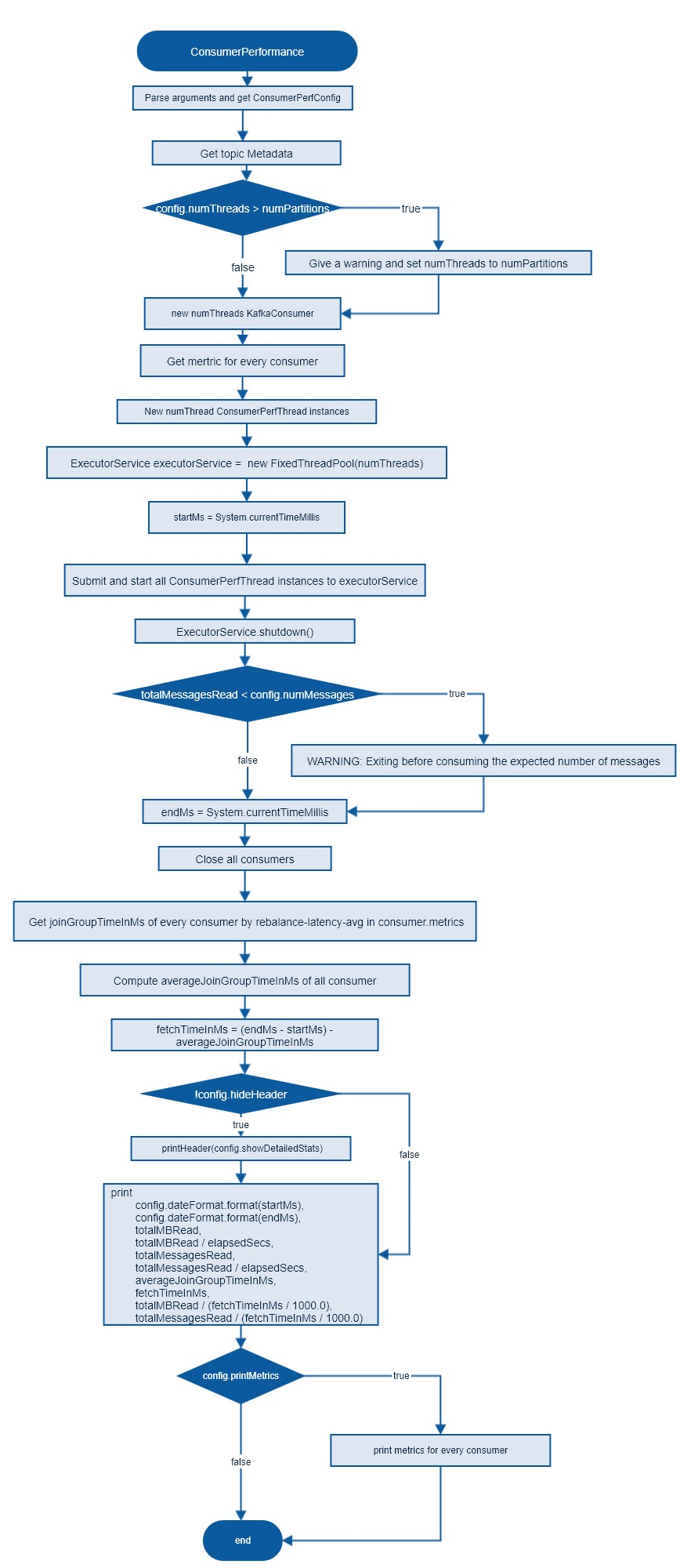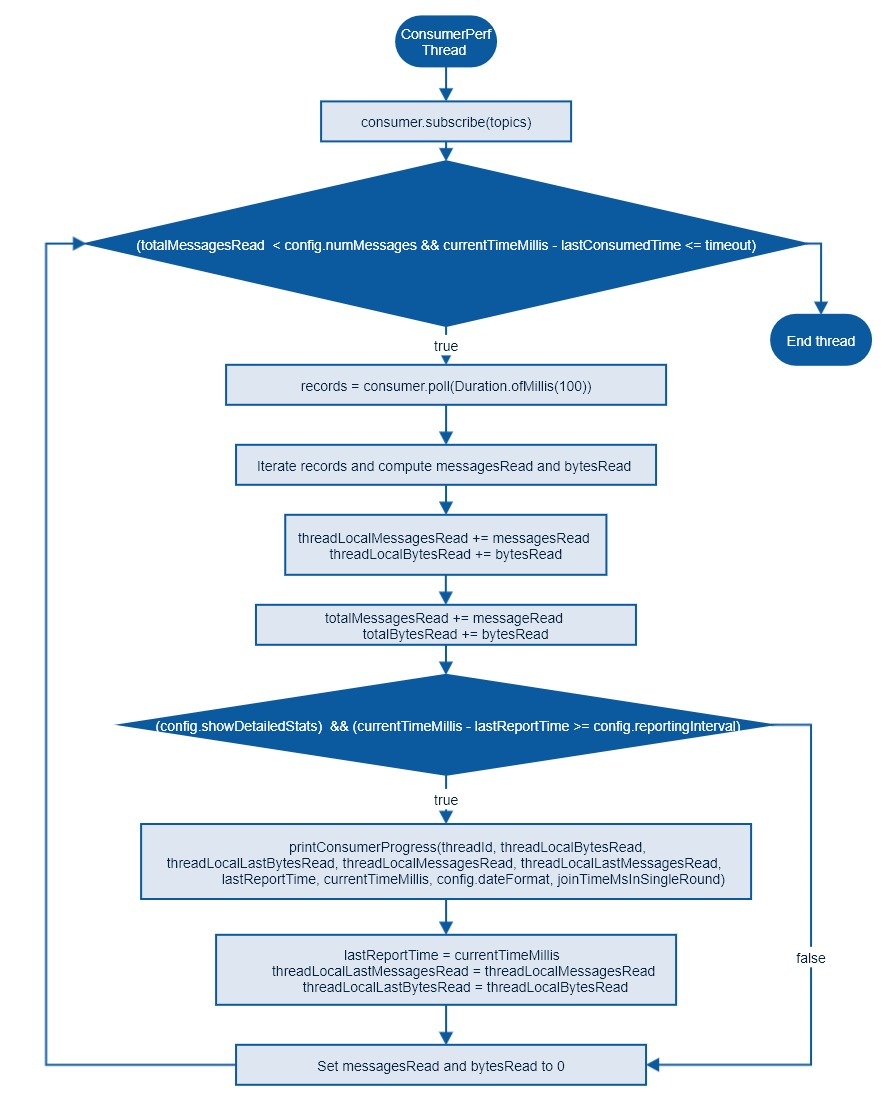package kafka.tools
import java.text.SimpleDateFormat
import java.time.Duration
import java.util
import java.util.concurrent.{ExecutorService, Executors}
import java.util.concurrent.atomic.LongAdder
import java.util.{Properties, Random}
import com.typesafe.scalalogging.LazyLogging
import kafka.utils.{CommandLineUtils, ToolsUtils}
import org.apache.kafka.clients.admin.{Admin, TopicDescription}
import org.apache.kafka.clients.consumer.{ConsumerConfig, KafkaConsumer}
import org.apache.kafka.common.serialization.ByteArrayDeserializer
import org.apache.kafka.common.utils.Utils
import org.apache.kafka.common.{KafkaFuture, Metric, MetricName}
import scala.jdk.CollectionConverters._
import scala.collection.mutable
object ConsumerPerformance extends LazyLogging {
def main(args: Array[String]): Unit = {
val totalMessagesRead : LongAdder = new LongAdder()
val totalBytesRead : LongAdder = new LongAdder()
val config = new ConsumerPerfConfig(args)
logger.info("Starting consumer...")
var joinGroupTimeInMs:Double = 0
if (!config.hideHeader)
printHeader(config.showDetailedStats)
var startMs, endMs = 0L
var numThreads = config.numThreads
val cluster_props = new Properties
cluster_props.put(ConsumerConfig.BOOTSTRAP_SERVERS_CONFIG, config.props.getProperty(ConsumerConfig.BOOTSTRAP_SERVERS_CONFIG))
val topicService = Admin.create(cluster_props)
val topicsInfo: util.Map[String, KafkaFuture[TopicDescription]] = topicService.describeTopics(Seq(config.topic).asJavaCollection).values()
val numPartitions = topicsInfo.get(config.topic).get().partitions().size()
if (numThreads > numPartitions) {
println(s"Warning: numThreads $numThreads is bigger than numPartition $numPartitions, set numThread to numPartition")
numThreads = numPartitions
}
val threadPool:ExecutorService=Executors.newFixedThreadPool(numThreads)
val consumers = new Array[KafkaConsumer[Array[Byte], Array[Byte]]](numThreads)
val metrics = new Array[mutable.Map[MetricName, _ <: Metric]](numThreads)
startMs = System.currentTimeMillis
for(i <- 0 until numThreads) {
consumers(i) = new KafkaConsumer[Array[Byte], Array[Byte]](config.props)
metrics(i) = consumers(i).metrics.asScala
threadPool.execute(new ConsumerPerfThread(i, consumers(i), List(config.topic), config.recordFetchTimeoutMs, config, totalMessagesRead, totalBytesRead, metrics(i)))
}
threadPool.shutdown()
import java.util.concurrent.TimeUnit
threadPool.awaitTermination(10, TimeUnit.HOURS)
endMs = System.currentTimeMillis
if (totalMessagesRead.sum() < config.numMessages)
println(s"WARNING: Exiting before consuming the expected number of messages: timeout (${config.recordFetchTimeoutMs} ms) exceeded. " +
"You can use the --timeout option to increase the timeout.")
for(i <- 0 until numThreads) {
metrics(i).find {
case (name, _) => name.name() == "rebalance-latency-avg"
}.map {
case (_, metric) => joinGroupTimeInMs += metric.metricValue.asInstanceOf[Double]
}.getOrElse(0)
}
joinGroupTimeInMs = joinGroupTimeInMs / numThreads
val elapsedSecs = (endMs - startMs) / 1000.0
val fetchTimeInMs = (endMs - startMs) - joinGroupTimeInMs
if (!config.showDetailedStats) {
val totalMBRead = (totalBytesRead.sum() * 1.0) / (1024 * 1024)
println("%s, %s, %.4f, %.4f, %d, %.4f, %.4f, %.4f, %.4f, %.4f".format(
config.dateFormat.format(startMs),
config.dateFormat.format(endMs),
totalMBRead,
totalMBRead / elapsedSecs,
totalMessagesRead.sum(),
totalMessagesRead.sum() / elapsedSecs,
joinGroupTimeInMs,
fetchTimeInMs,
totalMBRead / (fetchTimeInMs / 1000.0),
totalMessagesRead.sum() / (fetchTimeInMs / 1000.0)
))
}
if (config.printMetrics ) {
for (i <- 0 until numThreads) {
println(s"Metrics for thread $i")
if (metrics(i) != null)
ToolsUtils.printMetrics(metrics(i))
}
}
}
private[tools] def printHeader(showDetailedStats: Boolean): Unit = {
val newFieldsInHeader = ", rebalance.time.ms, fetch.time.ms, fetch.MB.sec, fetch.nMsg.sec"
if (!showDetailedStats)
println("start.time, end.time, data.consumed.in.MB, MB.sec, data.consumed.in.nMsg, nMsg.sec" + newFieldsInHeader)
else
println("time, threadId, data.consumed.in.MB, MB.sec, data.consumed.in.nMsg, nMsg.sec" + newFieldsInHeader)
}
private def printBasicProgress(id: Int,
bytesRead: Long,
lastBytesRead: Long,
messagesRead: Long,
lastMessagesRead: Long,
startMs: Long,
endMs: Long,
dateFormat: SimpleDateFormat): Unit = {
val elapsedMs: Double = (endMs - startMs).toDouble
val totalMbRead = (bytesRead * 1.0) / (1024 * 1024)
val intervalMbRead = ((bytesRead - lastBytesRead) * 1.0) / (1024 * 1024)
val intervalMbPerSec = 1000.0 * intervalMbRead / elapsedMs
val intervalMessagesPerSec = ((messagesRead - lastMessagesRead) / elapsedMs) * 1000.0
print("%s, %d, %.4f, %.4f, %d, %.4f".format(dateFormat.format(endMs), id, totalMbRead,
intervalMbPerSec, messagesRead, intervalMessagesPerSec))
}
private def printExtendedProgress(bytesRead: Long,
lastBytesRead: Long,
messagesRead: Long,
lastMessagesRead: Long,
startMs: Long,
endMs: Long,
periodicJoinTimeInMs: Double): Unit = {
val fetchTimeMs = endMs - startMs - periodicJoinTimeInMs
val intervalMbRead = ((bytesRead - lastBytesRead) * 1.0) / (1024 * 1024)
val intervalMessagesRead = messagesRead - lastMessagesRead
val (intervalMbPerSec, intervalMessagesPerSec) = if (fetchTimeMs <= 0)
(0.0, 0.0)
else
(1000.0 * intervalMbRead / fetchTimeMs, 1000.0 * intervalMessagesRead / fetchTimeMs)
print(", %.4f, %.4f, %.4f, %.4f".format(periodicJoinTimeInMs, fetchTimeMs, intervalMbPerSec, intervalMessagesPerSec))
}
def printConsumerProgress(id: Int,
bytesRead: Long,
lastBytesRead: Long,
messagesRead: Long,
lastMessagesRead: Long,
startMs: Long,
endMs: Long,
dateFormat: SimpleDateFormat,
periodicJoinTimeInMs: Double): Unit = {
val elapsedMs: Double = (endMs - startMs).toDouble
val totalMbRead = (bytesRead * 1.0) / (1024 * 1024)
val intervalMbRead = ((bytesRead - lastBytesRead) * 1.0) / (1024 * 1024)
val intervalMbPerSec = 1000.0 * intervalMbRead / elapsedMs
val intervalMessagesRead = messagesRead - lastMessagesRead
val intervalMessagesPerSec = ((messagesRead - lastMessagesRead) / elapsedMs) * 1000.0
val fetchTimeMs = endMs - startMs - periodicJoinTimeInMs
val (fetchIntervalMbPerSec, fetchIntervalMessagesPerSec) = if (fetchTimeMs <= 0)
(0.0, 0.0)
else
(1000.0 * intervalMbRead / fetchTimeMs, 1000.0 * intervalMessagesRead / fetchTimeMs)
println("%s, %d, %.4f, %.4f, %d, %.4f, %.4f, %.4f, %.4f, %.4f".format(dateFormat.format(endMs), id, totalMbRead,
intervalMbPerSec, messagesRead, intervalMessagesPerSec, periodicJoinTimeInMs, fetchTimeMs, fetchIntervalMbPerSec, fetchIntervalMessagesPerSec))
}
class ConsumerPerfConfig(args: Array[String]) extends PerfConfig(args) {
val brokerListOpt = parser.accepts("broker-list", "DEPRECATED, use --bootstrap-server instead; ignored if --bootstrap-server is specified. The broker list string in the form HOST1:PORT1,HOST2:PORT2.")
.withRequiredArg
.describedAs("broker-list")
.ofType(classOf[String])
val bootstrapServerOpt = parser.accepts("bootstrap-server", "REQUIRED unless --broker-list(deprecated) is specified. The server(s) to connect to.")
.requiredUnless("broker-list")
.withRequiredArg
.describedAs("server to connect to")
.ofType(classOf[String])
val topicOpt = parser.accepts("topic", "REQUIRED: The topic to consume from.")
.withRequiredArg
.describedAs("topic")
.ofType(classOf[String])
val groupIdOpt = parser.accepts("group", "The group id to consume on.")
.withRequiredArg
.describedAs("gid")
.defaultsTo("perf-consumer-" + new Random().nextInt(100000))
.ofType(classOf[String])
val fetchSizeOpt = parser.accepts("fetch-size", "The amount of data to fetch in a single request.")
.withRequiredArg
.describedAs("size")
.ofType(classOf[java.lang.Integer])
.defaultsTo(1024 * 1024)
val resetBeginningOffsetOpt = parser.accepts("from-latest", "If the consumer does not already have an established " +
"offset to consume from, start with the latest message present in the log rather than the earliest message.")
val socketBufferSizeOpt = parser.accepts("socket-buffer-size", "The size of the tcp RECV size.")
.withRequiredArg
.describedAs("size")
.ofType(classOf[java.lang.Integer])
.defaultsTo(2 * 1024 * 1024)
val numThreadsOpt = parser.accepts("threads", "Number of processing threads.")
.withRequiredArg
.describedAs("count")
.ofType(classOf[java.lang.Integer])
.defaultsTo(10)
val numFetchersOpt = parser.accepts("num-fetch-threads", "Number of fetcher threads.")
.withRequiredArg
.describedAs("count")
.ofType(classOf[java.lang.Integer])
.defaultsTo(1)
val consumerConfigOpt = parser.accepts("consumer.config", "Consumer config properties file.")
.withRequiredArg
.describedAs("config file")
.ofType(classOf[String])
val printMetricsOpt = parser.accepts("print-metrics", "Print out the metrics.")
val showDetailedStatsOpt = parser.accepts("show-detailed-stats", "If set, stats are reported for each reporting " +
"interval as configured by reporting-interval")
val recordFetchTimeoutOpt = parser.accepts("timeout", "The maximum allowed time in milliseconds between returned records.")
.withOptionalArg()
.describedAs("milliseconds")
.ofType(classOf[Long])
.defaultsTo(10000)
options = parser.parse(args: _*)
CommandLineUtils.printHelpAndExitIfNeeded(this, "This tool helps in performance test for the full zookeeper consumer")
CommandLineUtils.checkRequiredArgs(parser, options, topicOpt, numMessagesOpt)
val printMetrics = options.has(printMetricsOpt)
val props = if (options.has(consumerConfigOpt))
Utils.loadProps(options.valueOf(consumerConfigOpt))
else
new Properties
import org.apache.kafka.clients.consumer.ConsumerConfig
val brokerHostsAndPorts = options.valueOf(if (options.has(bootstrapServerOpt)) bootstrapServerOpt else brokerListOpt)
props.put(ConsumerConfig.BOOTSTRAP_SERVERS_CONFIG, brokerHostsAndPorts)
props.put(ConsumerConfig.GROUP_ID_CONFIG, options.valueOf(groupIdOpt))
props.put(ConsumerConfig.RECEIVE_BUFFER_CONFIG, options.valueOf(socketBufferSizeOpt).toString)
props.put(ConsumerConfig.MAX_PARTITION_FETCH_BYTES_CONFIG, options.valueOf(fetchSizeOpt).toString)
props.put(ConsumerConfig.AUTO_OFFSET_RESET_CONFIG, if (options.has(resetBeginningOffsetOpt)) "latest" else "earliest")
props.put(ConsumerConfig.KEY_DESERIALIZER_CLASS_CONFIG, classOf[ByteArrayDeserializer])
props.put(ConsumerConfig.VALUE_DESERIALIZER_CLASS_CONFIG, classOf[ByteArrayDeserializer])
props.put(ConsumerConfig.CHECK_CRCS_CONFIG, "false")
val numThreads = options.valueOf(numThreadsOpt).intValue
val topic = options.valueOf(topicOpt)
val numMessages = options.valueOf(numMessagesOpt).longValue
val reportingInterval = options.valueOf(reportingIntervalOpt).intValue
if (reportingInterval <= 0)
throw new IllegalArgumentException("Reporting interval must be greater than 0.")
val showDetailedStats = options.has(showDetailedStatsOpt)
val dateFormat = new SimpleDateFormat(options.valueOf(dateFormatOpt))
val hideHeader = options.has(hideHeaderOpt)
val recordFetchTimeoutMs = options.valueOf(recordFetchTimeoutOpt).longValue()
}
class ConsumerPerfThread(threadId: Int, consumer : KafkaConsumer[Array[Byte], Array[Byte]], topics: List[String], timeout: Long, config : ConsumerPerfConfig, totalMessagesRead : LongAdder,
totalBytesRead : LongAdder, metrics : mutable.Map[MetricName, _ <: Metric]) extends Runnable {
override def run(): Unit = {
var messagesRead = 0L
var threadLocalMessagesRead = 0L
var threadLocalLastMessagesRead = 0L
var bytesRead = 0L
var threadLocalBytesRead = 0L
var threadLocalLastBytesRead = 0L
var joinTimeMsInSingleRound: Double = 0
consumer.subscribe(topics.asJava)
// Now start the benchmark
var currentTimeMillis = System.currentTimeMillis
var lastReportTime: Long = currentTimeMillis
var lastConsumedTime = currentTimeMillis
while (totalMessagesRead.sum() < config.numMessages && currentTimeMillis - lastConsumedTime <= config.recordFetchTimeoutMs) {
val records = consumer.poll(Duration.ofMillis(100)).asScala
currentTimeMillis = System.currentTimeMillis
if (records.nonEmpty)
lastConsumedTime = currentTimeMillis
for (record <- records) {
messagesRead += 1
if (record.key != null)
bytesRead += record.key.size
if (record.value != null)
bytesRead += record.value.size
if (currentTimeMillis - lastReportTime >= config.reportingInterval) {
if (config.showDetailedStats) {
val currentThreadLocalBytesRead = threadLocalBytesRead + bytesRead
val currentThreadLocalMessagesRead = threadLocalMessagesRead + messagesRead
metrics.find {
case (name, _) => name.name() == "last-rebalance-seconds-ago"
}.map {
case (_, metric) => joinTimeMsInSingleRound = metric.metricValue.asInstanceOf[Double]
}.getOrElse(0)
printConsumerProgress(threadId, currentThreadLocalBytesRead, threadLocalLastBytesRead, currentThreadLocalMessagesRead, threadLocalLastMessagesRead,
lastReportTime, currentTimeMillis, config.dateFormat, joinTimeMsInSingleRound)
lastReportTime = currentTimeMillis
threadLocalLastBytesRead = currentThreadLocalBytesRead
threadLocalLastMessagesRead = currentThreadLocalMessagesRead
}
}
}
totalMessagesRead.add(messagesRead)
totalBytesRead.add(bytesRead)
threadLocalMessagesRead += messagesRead
threadLocalBytesRead += bytesRead
bytesRead = 0
messagesRead = 0
}
consumer.close()
}
}
}

